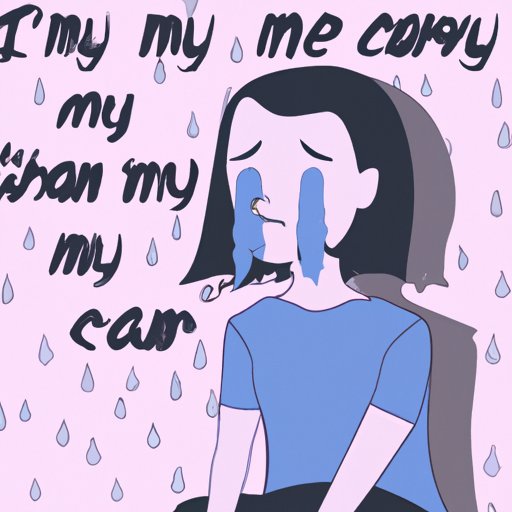Introduction
Crying is one of the most natural ways to express emotion. But what happens when you can’t cry anymore? This question can be a source of confusion and frustration, and it may lead to feelings of isolation and despair. It’s important to understand that not being able to cry doesn’t necessarily mean something is wrong with you, but it can indicate underlying mental health issues that need to be addressed. In this article, we will explore why can’t I cry anymore, including potential psychological causes and strategies for coping when you can’t cry anymore.
The Role of Emotional Regulation in Mental Health: How to Cope When You Can’t Cry Anymore
Emotional regulation is the ability to recognize, understand, and manage our emotions in a healthy way. It involves both controlling our emotional reactions and expressing our emotions in appropriate ways. Emotional regulation has been linked to better physical and mental health, improved relationships, and better decision-making abilities. So, if you’re struggling with not being able to cry, developing better emotional regulation skills can be an effective way to cope.
Here are some strategies for improving your emotional regulation:
- Identify triggers for negative emotions and learn how to respond in healthier ways.
- Understand your emotions and practice labeling them accurately.
- Practice mindfulness and other relaxation techniques to help manage intense emotions.
- Seek support from friends, family, or a mental health professional when needed.

Exploring the Psychological Causes of Inability to Cry
When someone is unable to cry, there may be a variety of psychological factors at play. Biological factors, like hormone levels and brain chemistry, can affect a person’s emotional response. Learned behaviors, such as suppressing emotions, can also contribute to an inability to cry. And trauma-related causes, such as PTSD, can lead to a lack of tears.
Examining the Impact of Trauma on an Individual’s Capacity to Cry
Trauma is any experience that is so overwhelming that it overwhelms the individual’s capacity to cope. Traumatic events, such as abuse or neglect, can have a profound impact on a person’s mental health and can lead to an inability to cry. Other types of trauma that can lead to this reaction include war, violence, and natural disasters.
The effects of trauma on mental health can be long-lasting and may include depression, anxiety, difficulty sleeping, and difficulty regulating emotions. If you’ve experienced trauma and are struggling to cry, it’s important to seek professional help. A mental health professional can help you develop strategies for coping with trauma-induced lack of tears.
Understanding the Interplay Between Stress and Not Being Able to Cry
Stress is a normal part of life, but too much stress can have a negative impact on our mental and physical health. Stress can interfere with our ability to regulate our emotions and can lead to an inability to cry. Common signs of stress-induced inability to cry include feeling emotionally numb, avoiding difficult conversations, and having difficulty expressing emotions.
To manage stress more effectively, it’s important to identify the sources of stress in your life and take steps to reduce or eliminate them. Developing healthy coping mechanisms, such as mindfulness, exercise, and talking to a trusted friend, can also help manage stress-related emotions.
Could My Lack of Tears be a Sign of Depression?
Depression is a serious mental health disorder that can cause a wide range of symptoms, including lack of energy, changes in appetite, difficulty concentrating, and difficulty expressing emotions. Depression can lead to an inability to cry, as well as feelings of hopelessness, guilt, and worthlessness.
If you think you might be depressed, it’s important to seek professional help. Treatment options for depression include therapy, medication, lifestyle changes, and support groups. With the right treatment plan, you can learn to manage your depression and find healthy ways to express your emotions.
What Are the Benefits of Crying, and What Happens When We Stop?
Crying is one of the body’s natural ways of releasing tension and stress. It can also help us process difficult emotions, such as sadness and anger. Crying can have physical benefits, such as reducing blood pressure, and psychological benefits, such as improving mood and relieving stress.
When we stop crying, we may be depriving ourselves of these benefits. We may also be denying ourselves a healthy outlet for emotions, which can lead to further emotional distress. If you’re struggling to cry, it’s important to find alternative ways to express your emotions.
How to Find Emotional Outlet When You Can’t Cry
Finding an emotional outlet when you can’t cry can be challenging, but there are several strategies that can help. First, it’s important to identify the emotions you’re feeling and try to understand their causes. This can help you better manage your emotions and find healthier ways to express them.
Some healthy outlets for emotions include talking to a friend or family member, writing in a journal, engaging in creative activities, and practicing relaxation techniques. It’s also important to remember that it’s OK to seek professional help if needed.
Conclusion
In this article, we explored why people may not be able to cry anymore and examined the mental health causes, such as trauma, stress, and depression, as well as strategies for managing emotions and finding healthy outlets. It’s important to remember that not being able to cry doesn’t necessarily mean something is wrong with you, but it can indicate underlying mental health issues that need to be addressed. If you’re struggling with not being able to cry, it’s important to seek professional help. With the right treatment plan, you can learn to manage your emotions and find healthy ways to express yourself.
(Note: Is this article not meeting your expectations? Do you have knowledge or insights to share? Unlock new opportunities and expand your reach by joining our authors team. Click Registration to join us and share your expertise with our readers.)
